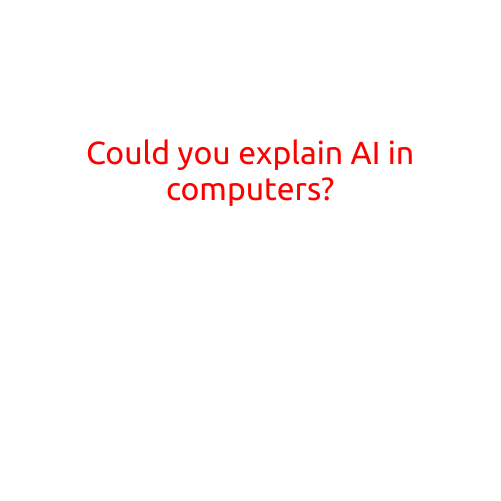
Could You Explain AI in Computers?
Artificial Intelligence, or AI, has become a buzzword in recent years, with many modern computers and devices relying on it to function smoothly. But what exactly is AI, and how does it work?
What is Artificial Intelligence?
Artificial Intelligence is a type of computer science that focuses on creating intelligent machines that can perform tasks that typically require human intelligence. This includes learning, problem-solving, and decision-making. AI systems are designed to simulate human thought processes, allowing them to adapt to new situations and learn from experience.
How Does AI Work?
AI algorithms are based on complex mathematical models that enable computers to analyze data, identify patterns, and make predictions or decisions. These algorithms are trained on large datasets, allowing them to learn from examples and improve over time.
There are several key components that make up an AI system:
- Machine Learning: A subfield of AI that enables computers to learn from data without being explicitly programmed.
- Natural Language Processing (NLP): A subset of AI that focuses on understanding and generating human language, such as text or speech.
- Neural Networks: A type of AI algorithm inspired by the human brain, which allows computers to recognize patterns and make decisions.
Types of AI
There are several types of AI, each with its own strengths and weaknesses:
- Weak AI: Designed to perform a specific task, such as playing chess or recognizing images.
- Strong AI: A hypothetical AI that possesses human-like intelligence, allowing it to perform any intellectual task that a human can.
- Superintelligence: An AI that is significantly more intelligent than any human, with the potential to revolutionize many aspects of life.
Applications of AI
AI has numerous applications in various fields, including:
- Customer Service: Chatbots and virtual assistants, such as Siri and Alexa, use AI to provide personalized customer support.
- Healthcare: AI is used in medical imaging, diagnosis, and treatment planning, as well as in developing personalized medicine.
- Finance: AI-powered trading platforms and financial analysis tools are becoming increasingly popular.
- Gaming: AI-powered game development and game analytics are changing the way we play and experience games.
Challenges and Concerns
While AI has many benefits, there are also concerns about its potential risks and challenges:
- Job Automation: AI may displace certain jobs, leading to unemployment and economic disruption.
- Data Bias: AI systems can perpetuate biases present in their training data, leading to unfair outcomes.
- Cybersecurity: AI-powered systems are vulnerable to cyber attacks and data breaches.
Conclusion
Artificial Intelligence is a rapidly evolving field with numerous applications in various industries. While AI has the potential to revolutionize many aspects of life, it also presents challenges and concerns that must be addressed. As AI continues to advance, it is important to ensure that its benefits are shared fairly and that its risks are mitigated to create a safer and more equitable world.





